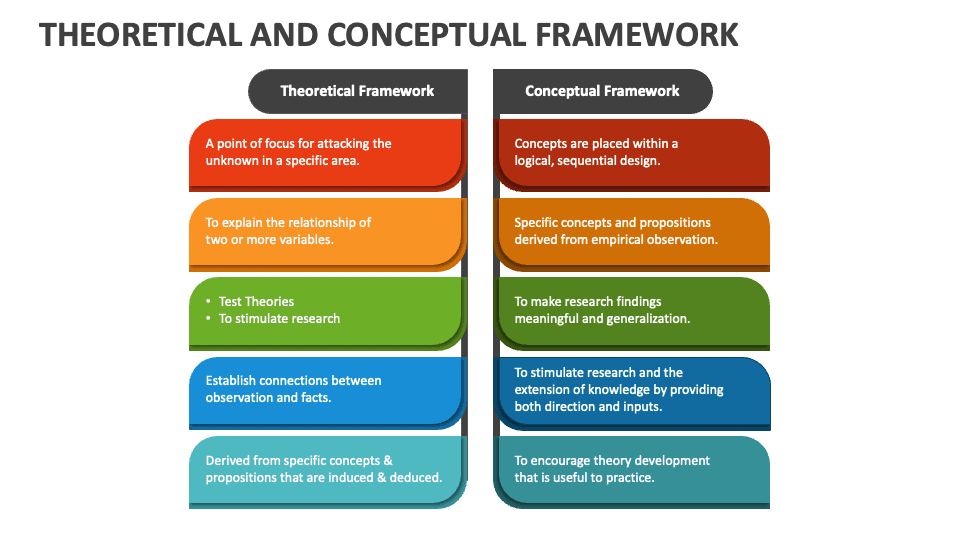Theoretical Framework in Research
In scholarly research, the theoretical framework is provided to describe the fundamental theory that applies to a given topic. Having a theoretical framework will help you frame your research within clearly defined concepts to support your research design and data analysis, making it easy for you to accurately interpret your results.
Difference between Theoretical Framework and Conceptual Framework
Many people assume that the theoretical and conceptual frameworks are the same thing. However, they are different from each other.
A theoretical framework derives from an existing theory, which has been tested and validated as an acceptable theory in scholarly literature.
A conceptual framework consists of constructs, key factors or variables that are presumed to have a relationship among them. The following is a comparison of the components that each has:

Source: Collidu website https://www.collidu.com/catalogsearch/result/?q=theoretical+framework
Purpose of the Theoretical Framework
The theoretical framework helps you justify your research, assess and refine the goals of your research, develop relevant research questions, select an appropriate methodology, and identify any validity threats to your results. The theoretical framework can strengthen your research because it helps you form a more rational and structured view of your research. It can also contribute to a new way of thinking about the theory/theories, and the theory’s/theories’ relationship to your topic, in particular.
Main Types of Theories
A theory is a formal statement of the principles or rules to explain a fact, event, or how something works. The following are the 3 main types of theories, which relate to descriptive, explanatory, and relational research.
- Descriptive theories, such as contingency theory and descriptive decision theory, explain phenomenon by identifying and describing its appearance, dimensions, elements. laws, principles, and/or dominant structures. Descriptive theories answer the question: “What is this?”
- Relational theories, such as the glass ceiling theory, explain the relationship between individuals, groups, situations, or events. The empirical evidence in research that uses these types of theories is supported by data obtained from quantitative methods and statistical analyses. These theories answer the question: “What is happening here?”
- Explanatory theories, such as the theory of evolution, explain confusing, complex, situations and events, and identify the cause(s). These theories answer the question: “What will happen if…?”
Some Commonly used Theories

- Systems theory
- Sense of community theory
- Behavioral theory
- Feminist Theory
- Self-efficacy theory
- Functionalist theory
- Cultural anthropology theory
- Human environment relations theory
- Cultural ecology theory
- Relational theory
- Marxist Theory
- Intersubjectivity theory
- Change theory
- Identity formation
- Community of Inquiry
- Poststructuralism
- Transformational theory
Examples of Theories that Relate to Specific Research
The choice of a theory depends on the focus of your research. The following are some examples of theories that could be used for a particular type of research.
- For research that involves analyzing a book, different literary theories, such as poststructuralism theory or Marxist theory could be used. Poststructuralism theory is used when analyzing the text and the system of knowledge, which produced the text.
- Social capital theory can be used in research focusing on the roles of social networks in a community that has a diverse population. This theory is often used to point out any inequities in cultural, economic, or social assets that exist in a community.
- In research involving leaders in a school or other educational environment, the transformational leadership theory can be used to investigate how school leaders implement a change process in the school.
- Cultural anthropology theory, human environment relations theory, and/or cultural ecology theory can be used in research that involves investigating how a group of people’s culture influences their attitudes towards saving and protecting the environment.
How to Develop the Theoretical Framework

It is important that your research question(s), problem, purpose, and significance are aligned and interwoven so that the theoretical framework guides your choice of the research design and data analysis. The following are guidelines to develop the theoretical framework:
- Define the key concepts in the questions and problem statement you are addressing in your research.
- Choose the theory/theories that best explain the relationship(s) between the key variables of your research.
- Write a literature review that explains, describes, and evaluates the existing theories that relate to your research.
- Provide a rationale for your choice of theory/theories. Discuss the relevance of the theory’s/theories’ theoretical assumptions and limitations to your research.
- Explain how your research fits into existing studies of fills a knowledge gap.
- If you had limitations or drawbacks when you applied the theory/theories, provide an explanation of why it failed to be completely applicable to your research and how you overcame any of these limitations or drawbacks.
Note: For more information, refer to the following webpages and YouTube video:
Indeed website: https://www.indeed.com/career-advice/career-development/theoretical-framework
Project Guru: https://www.projectguru.in/how-to-write-the-theoretical-framework-of-research/
What is Theory? What is Theoretical Framework in Research? Developing Framework with Examples: https://youtu.be/GPs-Q62D_Ns
 Waiting to Get Your Dissertation Accepted?
Waiting to Get Your Dissertation Accepted?







